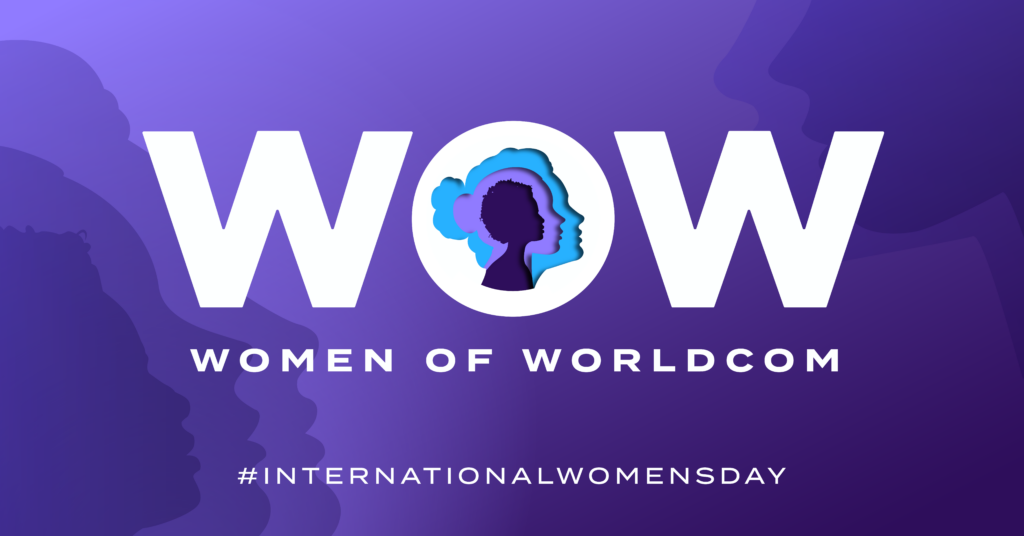Retaining talent is the second most discussed topic by over 100,000 C Suite executives in the global Worldcom Confidence Index panel, with almost three times as many leaders posting on retaining talent that attracting it. However, when you add in the number discussing attracting talent, it makes talent the number one issue for the C Suite – with almost one and a half times more doing so than posting about the economy.
In this fifth and final post in our five-post series, the Women of Worldcom Public Relations Group discuss how organizations should address this crucial business topic particularly in the light of the growing impact of artificial intelligence.
Provide strong opportunities for development
By Mayghan Dolmy, HR manager, Maarc, Paris, France
Companies are finding it increasingly difficult to retain their most valuable and talented employees in the long run. This is a crucial issue in human resources management, which results in significant costs in terms of recruitment, training, and productivity. Most of all, low retention levels can have a strong negative impact on the organisation and overall performance.
From an HR standpoint, it is therefore essential for Maarc, and other businesses around the world, to focus their efforts on providing strong opportunities for development and support. This can be done by ensuring employees are visible in the company, rewarding their performance, ensuring transparent and regular conversations between management and employees. In other words: creating a positive and supportive working environment that encourages a balance between personal and professional life.
This challenge is even more acute with the rise of AI, which is transforming businesses around the globe and in every sector, the skills required and working methods.
This is why Maarc, and others, will have to anticipate which professions will feel the impact most and the new careers which will emerge. We need to look at the possibility of leveraging with AI to advance professions and opportunities, rather than replacing the employee with AI. To do so, we will need to support, raise awareness, and train our employees so that they retain their employability.
Create a recommendable employee experience
By Catherine Purgly, Managing Partner, GRIP Agency, Zurich, Switzerland
In principle, artificial intelligence should be seen as an opportunity and driver of innovation in a company. Employees should be actively encouraged to try out artificial intelligence and contribute new ideas on how artificial intelligence could be used on the job. This creates a dynamic that also binds the best talent to the company. A range of further training and career planning for the personal and professional development of employees in the technological field is a must. No less important is the company’s external reputation. A company that actively promotes its employees and values opportunities for advancement is likely to be recommended by its best talents. What could be better than working for a company that you would recommend to your friends?
Keeping your best talent, especially in light of the impact of AI, requires a proactive and adaptive approach
By Jenn Lewis, Vice President, The Pollack Group, Los Angeles, USA
Keeping your best talent, especially in light of the impact of AI, requires a proactive and adaptive approach. We all know the saying, “Employees don’t leave jobs; they leave managers.” Therefore, leaders must provide employees opportunities to upskill and reskill, especially in areas that complement or leverage AI technologies. Employees should feel supported to explore new ideas, experiment with emerging technologies, and embrace change. Lastly, invest in your people by providing pathways for career advancement and professional development. Companies must be transparent and honest about AI and how it will impact the workforce. However, fostering a sense of purpose and meaning, despite the implications of technology, can help employees understand how their work can coincide with AI and provide a safe space for continuous learning.
Happy people do great work
By Lisa Wolleon, Executive Vice President, Coyne PR, New Jersey, USA
Being the best place to work is Coyne’s mission, and it’s really all about retaining the best talent. Happy people do great work, and that makes for happy clients. In relation to the impact of AI, embrace it, use it, learn it, and love it because it will give us the freedom to be more efficient in our jobs. It may help with the more remedial tasks, giving us the opportunity to be more creative and focus on the parts of the job we are most passionate about. And always remember, the human touch makes the tools great.
Networking is not only for outside of the office
By Jennifer Kamienski, Executive Vice President, Coyne PR, New Jersey, USA
Encourage “internal networking.” Understanding your colleagues as a person beyond the office is what builds a trusted and loyal relationship. Just like with any client, it is hard to leave someone when you shared a meal, have been to their house, and watched their kids graduate from grammar school. Genuine, authentic connections that are built on common grounds are the key to successful retention. From the famous line in The Godfather – “It’s not personal. It’s strictly business” – I believe in the opposite. I believe in making business personal – personal connections. I believe in colleagues who are friends. During an interview, if you can’t imagine being stuck in O’Hare for seven hours together than you might not want to make that hire. Relationships are key with media and with your team.
Show a future path to advancing their careers
By Cathy Clarkin, Chief Financial Officer, Coyne PR, New Jersey, USA
Organizations must offer competitive salaries to retain talent and make employees feel valued. It is essential to provide continuous training on AI and all other technologies. Employees want recognition for their accomplishments and know there is a future path to advancing their careers. A simple please and thank you can go a long way. Leaders need to be understanding and flexible.
Help employees navigate the changes brought about by AI
By Clara Heffernan, Chief People Officer, Coyne PR, New Jersey, USA
Retaining top talent, especially in the evolving landscape influenced by artificial intelligence (AI), requires a multi-pronged strategy. The impact of AI on future jobs may be significant, but it should create more opportunities than challenges for both the agency and the employee.
Strategies for retention are:
- Creating a constant cascade of professional development. Focusing on skills that AI cannot replace but rather enhance is of the utmost importance. These include creative thinking, problem solving, client management skills, team management skills, etc.
- Show employees how the traditional agency roles will evolve using AI as opposed to roles going away. To do this create evolved career paths where using AI eliminates some of the very tedious work but allows more time to be spent on the more interesting work.
- Maintain open lines of communication about the impact of AI on the industry and the organization, including the challenges and opportunities it presents. Encourage feedback from employees on how AI is affecting their work and use this feedback to guide future strategies.
By implementing these strategies, organizations can retain their best and strongest resources and help them navigate the changes brought about by AI, turning potential challenges into opportunities for growth and innovation.
Ensure people feel valued, engaged, and welcome on a daily basis
By Vessela Denborova, Communications & Event Manager, Janev and Janev, Bulgaria
There are many factors that influence the motivation and desire of talent to stay in a company. The Covid-19 pandemic, the evolution of technology and, above all, the entry of the new workforce into the labour market (millennials and Gen Z) make the process of retaining the best talent a challenge. If 20 years ago an employee started working in one place with the idea that they wanted to stay there for a long period of time, today with the new workforce there are different ways of working and different motivators. Why an employee decides to stay in a job is very often related to what the company values them at. It is far from just the salary, it is all the benefits and opportunities that are provided, the experiences that he or she has during the work process, whether he or she feels valued, engaged, and welcome on a daily basis. In other words, talent retention is about understanding their motivation. Artificial intelligence can be very helpful in this process by using various surveys and tools to analyze employee sentiment. This provides valuable insights into the level of satisfaction and areas that need improvement.
If we focus too much on technology, we forget people
By Elena Valcheva, Special PR and PA Advisor, Janev and Janev, Bulgaria
I recently had a conversation with my granddaughter (9y/o), who told me that she did not see the point in learning and that soon she would be able to get a chip in her brain and know everything. I asked her, “What will your brain do then?” – realizing that the topic of this conversation was provoked by Artificial Intelligence.
We are at a turning point in the development of humanity – a new technological revolution based on AI. AI will give a critical advantage to whoever owns it, and that likely means limitless power.
This technology is as important to countries as nuclear weapons are, but at the same time, it is relevant to every person and will affect us in unpredictable ways.
Here comes my granddaughter’s answer to my question “What will her brain do?” – “Well, it’s going to sit there.”
If AI verifies every idea, what will happen to the next generations? Let us not forget that personal achievements bring meaning to everyone’s life.
To me there is no greater thing than the human brain and if we stop training it, we have lost the game. In focusing too much on technology, we forget people. People and their development come first, and technology should work for them, not rule over them.
Ensuring that your organization is involved in your community can increase retention rates
By Kara Lundberg, VP, Talent, RH Strategic, Seattle, USA
Organizations should be less concerned about AI taking communications jobs, but rather more excited about how AI will enrich our jobs. At RH Strategic we are encouraging curiosity around AI, particularly how it can juice our strategic thinking by constantly being educated about new initiatives, issues and events that are impacting clients in our core industries. We’ve created motivation for our staff to geek out on AI and share their findings which is giving people purpose and showing them how to work efficiently, allowing them more time to do the fulfilling work which feeds our retention goals.
Aside from AI, if an organization’s size can accommodate it, giving individuals opportunities to support core firm functions increases their feelings of accomplishment and valuable input. We’re fortunate to be sized right where our staff can support firm functions at varying levels from writing one-off blogs for the website and participating in new business research, to running engaging employee recognition programs and full departments like operations, talent, marketing and growth. Our team finds meaning in our client work, but having the opportunity to participate in the success of the firm gives them great purpose.
Finally, ensuring that your organization is involved in your community can increase retention rates. Taking time to get out of the office or step away from a laptop to volunteer in your community is meaningful to employees. Consider coordinating team-wide volunteer opportunities and offering a personal Day of Service benefit where employees can take time off work to directly give their time to organizations closest to them. We find that this time away – giving back – brings employees closer to the organization that gives them time to do things uniquely meaningful to them.
Organizations should implement policies that support work-life balance
By Marcela Vylitová, Consulting Director, PRAM Consulting, Prague, Czech Republic
Here are a few pieces of advice related to women’s work, talent management, and retaining women in the team long term:
- In our region companies should actively work towards providing equal opportunities for women including the management positions. Providing access to mentorship programs, leadership training, and opportunities for skill development can empower women to advance in their careers and feel valued within the organization.
- Organizations should implement policies that support work-life balance, such as flexible working hours, parental leave, and childcare support or wellness/health programs.
- Offering flexible working hours, remote work options, and part-time opportunities can help women balance their professional and personal responsibilities more effectively and has been seen as a great organisational advantage in hiring process.
- Companies should strive to eliminate gender pay gaps that still exist in our region. This may involve conducting regular pay equity reviews/study, especially in some industries (IT, technology, automation, production and management roles)
- Bringing women back to work and support various programmes so they can re-start their career after maternity leave. Creating a workplace culture that values diversity and offers a platform for women’s voices to be heard can significantly impact retention rates.
Failure to recognise individual contributions, or address genuine concerns from staff, can erode employee trust and engagement
By Susie Horgan, Founder and Managing Director, Springboard Communications, Cork, Ireland
In today’s competitive landscape, financial incentives are no longer sufficient to stand out as employers of choice. By adopting agile internal communications approaches, and prioritising smart employee engagement (and experiences), agencies can build positive cultures, foster employee advocacy, and retain talent.
Leadership can set the tone in any operation and impress upon co-workers the importance of collective responsibility; showing up also implies showing up for others. In essence, it’s part of the social contract and commitments we make to each other.
That said, failure to recognise individual contributions or address genuine concerns from staff can erode employee trust and engagement. This leads to dissatisfaction and attrition.
When soliciting feedback from employees, it’s crucial to demonstrate an ‘open door policy’; being responsive and acknowledging input is essential. Encouraging two-way feedback and adopting a solutions-orientated approach improves workplace satisfaction and strengthens culture. The value of genuine employee loyalty is not to be underestimated.
Having clear sustainability goals and strategies is imperative
By Sandy Boundy, Director of Strategy & Insight, Springboard Communications, Cork, Ireland
In a candidate-driven market, employers must differentiate themselves by showcasing their impact. Understanding the needs of current and potential employees is crucial. For instance, Deloitte’s Gen Z and Millennial Survey revealed that over 60% of Gen Zs and millennials are concerned about the environment, with over 50% researching a brand’s environmental stance before employment. Hence, having clear sustainability goals and strategies is imperative.
Beyond sustainability, becoming an employer of choice necessitates demonstrating a commitment to Diversity and Inclusion, employee development, wellness initiatives, and community engagement. By addressing these aspects, organisations can attract top talent and retain employees in an increasingly competitive landscape.
Taking a holistic approach to what your company offers employees
By Sharon Neumann, Chief Operating Officer, Airfoil Group, Michigan, USA
When it comes to retaining top talent, it’s not a one-size-fits all strategy. Career and job expectations vary widely from one employee to the next. What’s important to a new college graduate isn’t going to be the same for a new parent or someone approaching retirement. Taking a holistic approach to what your company offers employees (tangible and intangible) is key to identifying pain points and addressing concerns of employees at all experience levels. Employees stay with organizations where they feel respected, their contributions are valued, and they have the opportunity to grow professionally.
To keep your top talent give them the tools to shine even brighter
By Lisa Garcia, Partner/COO, Sachs Media, Florida, USA
AI’s shaking up the job scene, and it’s got employers scrambling to not just keep their top talent but also give them the tools to shine even brighter. It’s all about getting employees and clients excited about AI, showing them how it’s not just a buzzword but a real game-changer for what they can do. Companies are rolling out online courses and extra cash rewards for diving into hot topics like digital analytics and tech communications. This isn’t just about earning lucrative salaries, it’s about making sure everyone’s competitive in ways that matter. Creating these growth opportunities means employees can buff up their skill sets or pick up entirely new ones, keeping them sharp in a world that never stands still. This whole push for growth isn’t just a nice-to-have. It’s what keeps a company in the lead, attracting fresh faces with skills and the kind of attitude that spells success. With these types of initiatives, companies aren’t just keeping pace with the times, they’re building a place where talent blooms, making sure they’re not just surviving but also thriving.
Make your culture a reflection of your mission and core values
By Leah Chalet, Chief Operating Officer, True Digital Communications, Cleveland, USA
Our retention has improved in recent years, and I believe this is largely due to three factors – people, processes, and culture. Our culture is a reflection of our mission and core values. We hire team members not just based on skillset and experience, but based on core competencies that align with our culture. Having the right people in the right seat is critical. Our culture is also largely centered on people and relationships. At True, we say business isn’t just business, business is personal. And we make business decisions with people in mind. Lastly, we’ve spent a lot of time over the last few years defining very clear processes. Having defined processes has allowed us to set clear expectations for our team and provided them with the knowledge and resources to succeed within their roles. I think creating this foundation has enabled us to continue to grow at a modest and scalable pace.
What drives workplace satisfaction is the core fundamentals of human relationships
By Michelle Rash, Vice President and Chief Operating Officer, RLF Communications, North Carolina, USA
The Covid-19 pandemic has changed many things about the way we work and the way we perceive value in the workplace. For years people thought that by offering new and creative benefits, social activities and a great workplace culture would be key to recruiting and retaining the best employees. But as the workplace has shifted, we have learned those may not be as valuable as we once thought they were — especially as more people work remotely. What truly drives workplace satisfaction are the core fundamentals of human relationships. People want to feel appreciated and valued. They want opportunities to grow but the freedom to make mistakes. Even as AI continues to transform the way we work, what brings people to a job and keeps them engaged and happy there have not changed. Make people feel appreciated and valued and help them achieve.
Can we help?
If you would like help from any of the experts featured in this post, please contact them via individual agency pages or via their LinkedIn profiles. For any of our other experts please contact Todd Lynch or visit our offices page.
And, if you’d like to keep your communications strategy ahead of the curve, see what over 100,000 C Suite executives around the world are thinking by visiting our Worldcom Confidence Index global tracker.








